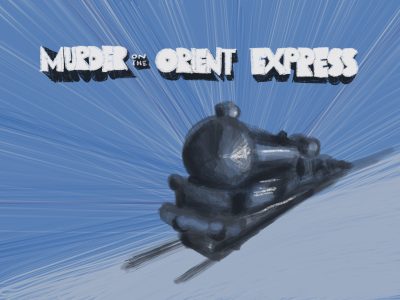When a friend of mine first asked me to go watch “Murder on the Orient Express” with them I gladly said yes, believing they were referring to the movie. And so I arrived at the College of Arts and Sciences last Friday evening only to be surprised with a theater performance –– I was incredibly enthused, as I’ve always enjoyed theater.

We found our seats inside the Tsai Performance Center and I prepared myself for a wonderful time –– but I clearly did not prepare myself enough.
Seeing as this is an adaptation of a novel, I’d like to focus on the acting and directing for the play.
I love the original novel, which has been clear to me since I first read it, but much praise has been directed toward its intricate storyline and fascinating characters. Therefore, focusing on the factors largely controlled by the members of the BU Stage Troupe is the best course of action.
I’d like to first commend the absolutely incredible director Mariam Hydara. Before the play began she gave a speech to the audience, commenting on her first experience as a director. She mentioned the astonishing fact that the production only took six weeks to complete, including set production, costuming and rehearsals. From the often dramatic lighting — something for which I must also credit the lighting crew — to the excellent blend between comedic and dramatic moments, Hydara manages to bring about a cohesive and captivating work.
What particularly caught my eye is the direction during the final reveal scene.
When the play started, I worried over how they would achieve this pivotal moment in the story. However, Hydara managed to make capturing flashbacks in theater look like a simple task. This sequence felt distinct and creative in ways I can seldom describe. Despite knowing what the major twist was, I was effectively made to feel surprised.
There were – I must mention – some small moments of directorial mishaps, although most of these I attribute to the quick pace of the production.
I occasionally noticed moments where the sound effects didn’t match the actions being taken on stage, a fact I noticed most frequently with door knocks and slams. The occasional instance of actors unintentionally interrupting each other also reflected a lack of rehearsals, but these were few and far between. These are ultimately minor, yet noteworthy, nitpicks that had little effect on my enjoyment, outside of any light breaks to immersion.
When it comes to actors it is difficult to avoid immediately talking about Rohan Misra. He played the role of Hercule Poirot, a slightly arrogant but brilliant Belgian detective who serves as the play’s protagonist. Misra played the role brilliantly, lending the character a sense of confidence and gravitas that would be difficult to more thoroughly describe.
He also managed to teeter the line between comedy and drama wonderfully, much like the play itself does –– this was best highlighted by the previously mentioned reveal scene. As the actor at the scene’s core, Misra masterfully adapted between the comedy and drama the scene mixes together.
I also must mention Poirot’s closing monologue.
Misra maintained audience engagement throughout the entirety of it to create very impactful final moments. Even now, some days later, I cannot seem to push it out of my mind.
The rest of the cast was undoubtedly talented. Each one of its members played their characters with such zeal and passion that it is difficult to point to any favorites.
The comedic reliefs of the play were continuously entertaining. I’ll draw particular attention to Hannah Rolighed’s Helen Hubbard, who constantly drew laughs from both me and the audience. She ensured that the play remained relatively lighthearted throughout with her bombastic performance and fantastic comedic singing.
Her co-stars Lauren Mann, Alice El-Ouzzane, Eli Lynch and Eric Rogers — who played Greta Ohlsson, Princess Dragomiroff, Michel and Monsieur Bouc respectively — also constantly injected comedy to the play. Their comedic timing and rapport with each other was impressive to say the least, as was their seemingly effortless accent work. Many of them had never played a character with Stage Troupe before –– but you can barely tell.
Another standout member of the cast is Clara Haymon, who played the mysterious Countess Andrenyi. The moment she stepped on stage, I felt deeply intrigued by the character –– something I can thank Haymon for. She managed to quickly and effortlessly establish the Countess as an eclectic figure and a significant force within the narrative. When we left the theater my friend said their favorite performance was Haymon’s –– and it is easy to see why. She added an extraordinary amount of emotion to every scene she was in, especially those she shares with Poirot.
I must add that it is not quite as fantastic as the book. The play, for obvious reasons, had to be shortened and its themes simplified. The book also includes far more characters, some of which were sorely missed in the play. The play’s mystery was also considerably simpler, another consequence of the medium. Despite this, the play should in no way be diminished for “not living up to” the book.
With all of this in mind, and for lack of the necessary words to describe my full feelings on the play, I’d like to rate the show a 9.5/10. It was thoroughly enjoyable, riddled with fantastic actors, and displayed the full talent of its director.
With all this in mind, I can safely say that I am trembling with anticipation over the Stage Troupe’s future projects.


















































































































